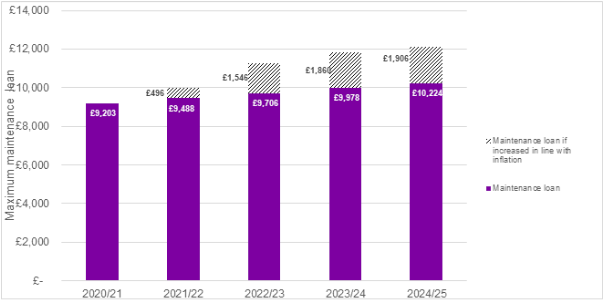Students Set to be Poorer After Maintenance Loan Announcement

By Archie Thomas, BA Politics and International Relations
Maintenance Loans for students in England will rise by 2.5% next academic year in line with projected inflation. Currently, inflation stands at 4% meaning students’ purchasing power and living standards will continue to fall.
This follows increases of 2.3% and 2.8% in 2022/23 and 2023/24 respectively, despite RPI (retail price index) inflation reaching 13.8% in 2022 and 11.6% in 2023. A real terms cut of 11% since 2020.
In a statement to the House of Commons on 25 January, Government Minister Robert Halfon explained that: “The 2.5% increase follows standard procedure to base annual increases in support on forecasted inflation. Decisions on student finance have had to be taken to ensure the system remains financially sustainable and the costs of higher education are shared fairly between students and taxpayers, not all of whom have benefited from going to university.”
Tom Allingham from Student money site Save The Student branded the new rates as “utterly inadequate, and risk condemning students to a never-ending cost of living crisis.” Continuing, Allingham explained that: “Although inflation is falling, the real-terms cuts to the Maintenance Loan have not been reversed. Even if this 2.5% increase matches inflation in the next academic year, students from the poorest backgrounds will still be up to £1,300 per year worse off in real-terms.”
Many have labelled this a student cost of living crisis. A 2023 survey found that 18% of students use food banks and almost two-thirds of students skip meals to save money.
The government also announced an extra £10 million investment into university hardship funds. According to Save the Student this will amount to roughly £5 per student.
Many have labelled this a student cost of living crisis. A 2023 survey found that 18% of students use food banks and almost two-thirds of students skip meals to save money.
Martin Lewis from the TV show and website Money Saving Expert responded to the announcement saying “This is another nail in the coffin of student finance” and that “This is especially detrimental to those from low-income and non-traditional university backgrounds who rely on the full loan (which is means-tested based on parental income) as there are no parental funds to support them.
As this has happened during a time when rents have rocketed, the shortfall in funding risks depriving those students of the ability to go to courses, and risks increasing dropout rates while there.”
The Russell Group also expressed their disappointment with the announcement and urged the government to reassess.
An ongoing petition to ‘Increase Student Loans in England to catch up with inflation’ on the UK parliament’s petitions website has reached more than 12,000 signatures. The Government responded to this on 26 January stating that “The Government has continued to increase loans for living costs each year with a 2.8% increase for the current academic year, 2023/24, and a further 2.5% uplift announced for 2024/25.”

Chart produced by the Russell Group highlighting how the maintenance loan has fallen behind inflation [Credit: Russell Group]
[Photo Credit: Birmingham University]



